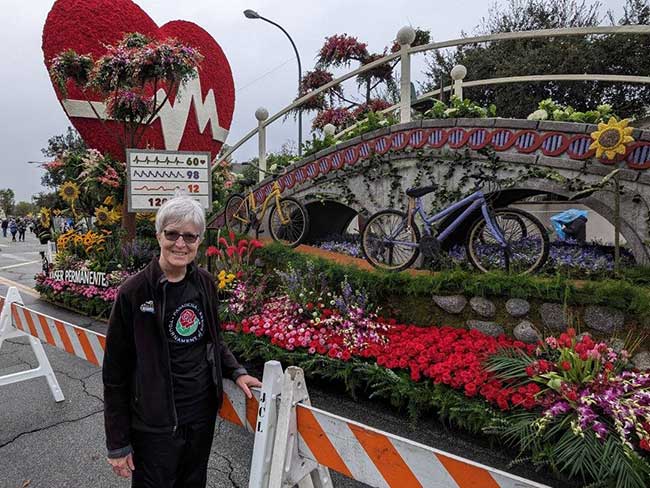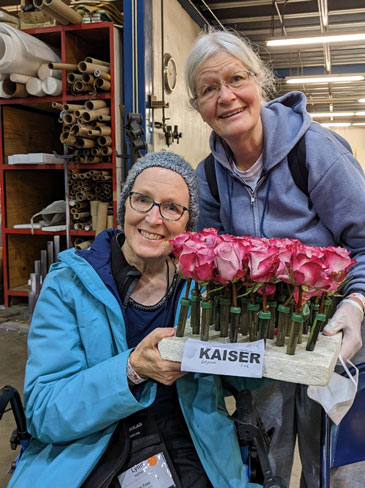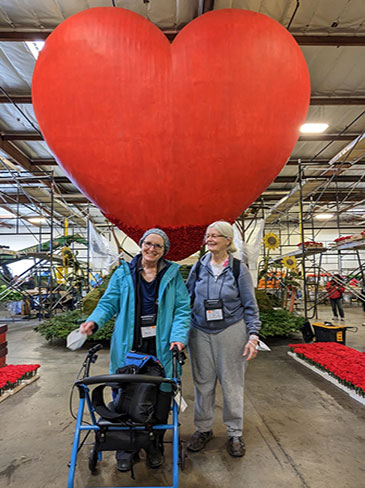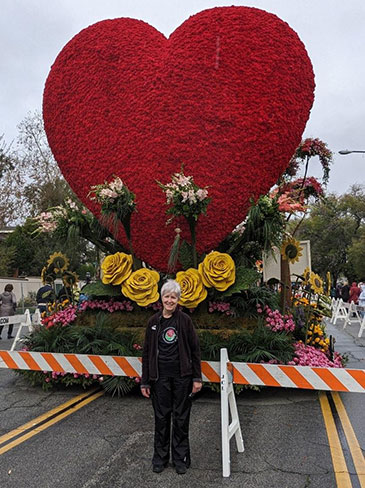Making dreams come true
Member achieves bucket list goal of helping to build a Rose Parade float, thanks to her care team at Kaiser Permanente in Colorado.
Lynn Replinger proudly worked on the Kaiser Permanente Rose Parade float.
Lynn Replinger, 66, loves flowers. For well over a decade, her bucket list has included a trip to Pasadena, California, to work on a float for the Rose Parade. As an amateur flower arranger, Replinger appreciates that the floats must be covered with living materials, like moss, flowers, and plants.
Replinger tried to attend the Tournament of Roses festivities in 2021, but she was too sick and in the hospital.
In 2022, Replinger’s cancer and palliative care teams at Kaiser Permanente in Colorado made it a mission to help her reach her goal. Her cancer treatment was paused temporarily so she wouldn’t feel too yucky — as she put it — to travel and enjoy the special trip with her big sister, Gail.
“The point of cancer treatment is to help you live life. So go out and live it!” said Replinger, who has been a Kaiser Permanente member for 32 years.
Replinger was 37 when she was first diagnosed with breast cancer.
“My care at Kaiser Permanente has been excellent,” she said. “When my cancer came back the second time, my friends encouraged me to get a second opinion. I went to the University, where the oncologist said, ‘You’re getting the gold standard — stick with Kaiser Permanente!’”
After fighting the second bout of cancer, Replinger and her family enjoyed a 21-year remission. Unfortunately, the cancer returned 4 years ago in her lungs and lymph nodes.
“In June, they told me most people in my position would have had 3 to 6 months to live. I’m not most people, thank goodness!” said Replinger.
Multiple ologists and seamless communication
“I have an oncologist, cardiologist, pulmonologist, primary care doctor, ophthalmologist, endocrinologist, gastroenterologist — more ologists than anyone should hope to have! But they’re all great!” exclaimed Replinger.
Replinger shared that communication between her many ologists has been seamless. The specialists can easily collaborate to review and advise on her personalized treatment plan, thanks to Kaiser Permanente’s integrated care model. Her electronic health record helps keep her whole care team updated on her progress.
Having all the specialists knitted together has been particularly helpful to Replinger before certain treatments and surgeries.
“They’re a team, and they treat me as a full member of the team. They listen to me and explain why a certain treatment might be good and ask me for my opinion, which I really appreciate,” said Replinger. “I love my KP team. They're very good at realizing the need to balance living with staying alive.”
Replinger’s cancer is aggressive and mutating quickly. She’s been through many forms of chemotherapy and immunotherapy.
“I’m fortunate to have a caring team and a team that knows if you’re fighting cancer, you do it so you can live life and spend time with your loved ones.”
Navigating cancer and holding onto hope
A few days before the Rose Parade in Pasadena, Replinger and her sister Gail — who is also a breast cancer survivor — fluffed red carnations to cover the gigantic heart on the Kaiser Permanente float and crushed coconuts for the white spaces on the Louisiana Celebration Riverboat float.
On parade day, Replinger “enjoyed the energy of the participants and seeing how the floral materials were used to create all the gorgeous floats.”
Replinger is a firm believer in holding onto hope and encourages others not to automatically link a cancer diagnosis with death.
“Medical science is progressing so rapidly that you need to hold onto hope. They’ll find a treatment best suited for your situation. My oncologist, Jesus Hermosillo Rodriguez, MD, is always looking at new research and trying new treatments. He’s persistent. He doesn’t say, ‘You’ve run out of options.’ Instead, it’s ‘Well, let’s try this one.’”
Ongoing cancer research
Getting to participate in the Rose Parade thanks to her Kaiser Permanente care teams isn’t the end of Replinger’s story. She continues to take advantage of new cancer treatments, and she’s also helped contribute to the cancer research field.
In addition to Replinger’s sister, her mother, grandmother, aunt, and 5 cousins have had breast cancer. After going through genetic counseling at Kaiser Permanente, Replinger and her family were invited to participate in a University of Washington research study that identified the PALB2 gene, which carries a higher risk of breast cancer. The American College of Medical Genetics and Genomics calls the PALB2 mutation the “third most important breast cancer gene after BRCA1 and BRCA2.”
“Because there were so many of us, it was even easier data to find the gene mutation. It’s even easier for cousins, than for mothers and daughters, because they don’t share as much genetic material. We got into that study because of Kaiser Permanente.”
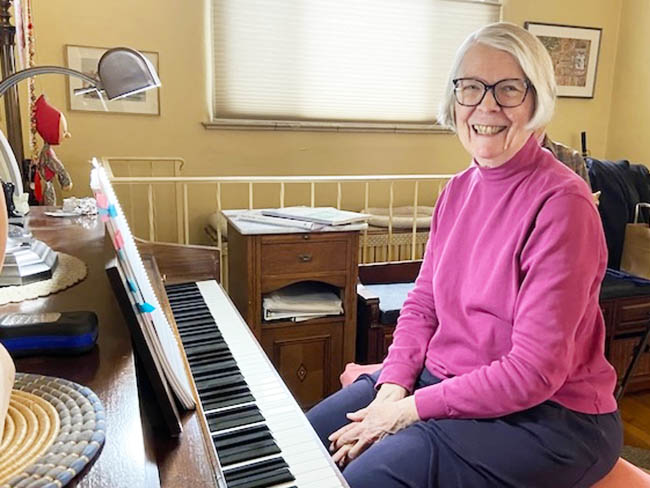
May 19, 2025
Member praises 50 years of collaboration with care teams
Karen Hansen’s doctors and clinicians have partnered with her to customize …

April 30, 2025
From fighter to father: How addiction care changed his life
Travis Taylor has substance use disorder and mental health conditions. …
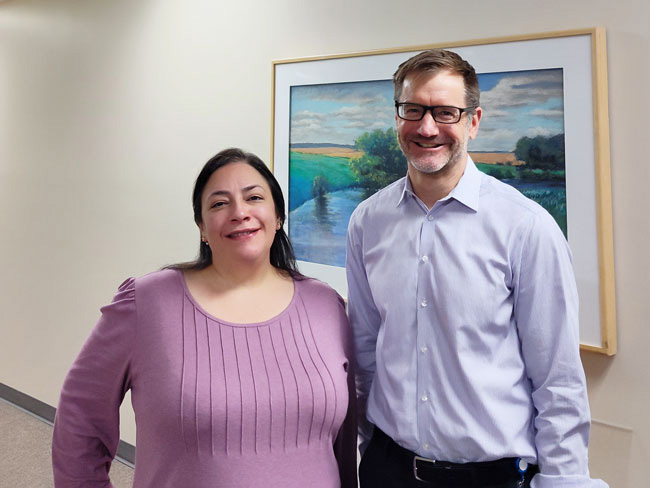
April 25, 2025
Treating the heart and lungs together for a rare disease
With her medical teams working together, Sirina Hazeem is getting her life …

March 27, 2025
Living proof: Colon cancer highly treatable if caught early
There is an alarming rise in colon cancer rates among younger adults. Cynthia …
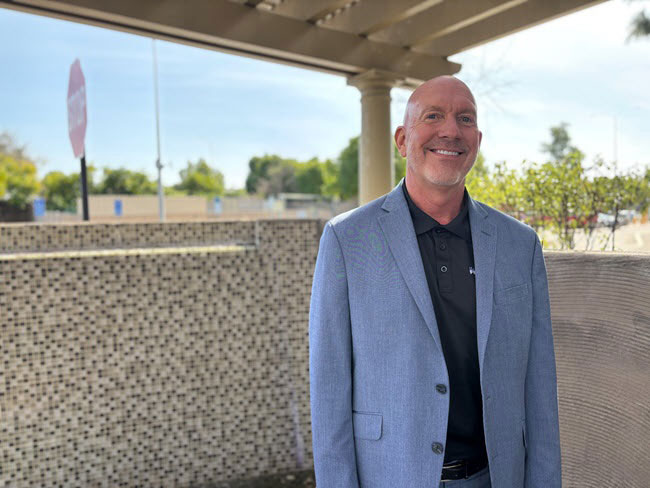
February 27, 2025
‘The heart attack that saved my life’
A sudden heart attack led Mark Twichel to seek care at Kaiser Permanente …

February 26, 2025
Colon cancer: Do you need to be screened?
If you’re age 45 or older, getting checked regularly for colorectal cancer …

February 18, 2025
I just need a chance
Billy Cardosi spent his life putting his family and job first. Then a heart-rela …

February 14, 2025
A fulfilling life on the other side of ovarian cancer
As a wife and a mother, Autumn Gray was determined to beat cancer to be …
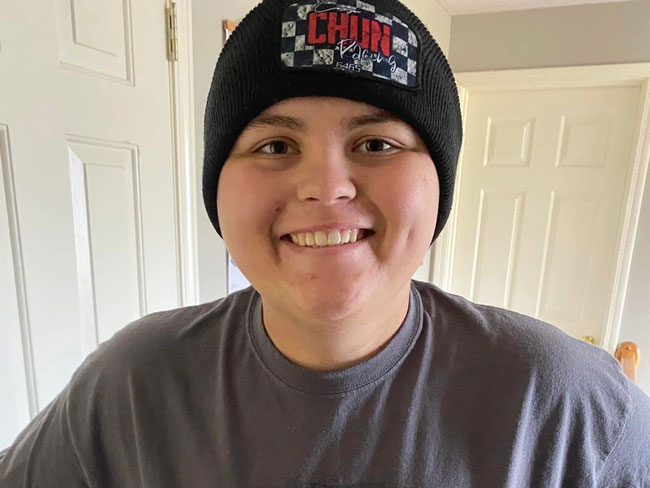
February 12, 2025
Back on track after a rare cancer diagnosis
After facing sarcoma at age 18, drag-racing champion Cooper Chun needed …
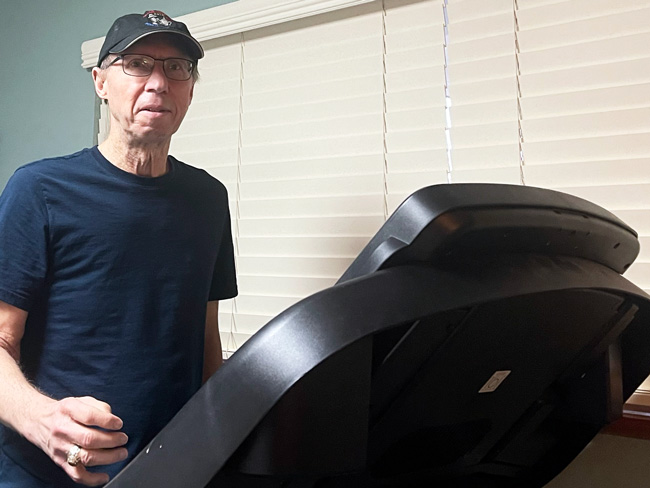
January 15, 2025
After surgery, home was where his heart was
Virtual cardiac rehabilitation offers Mike Erskine a convenient, safe way …
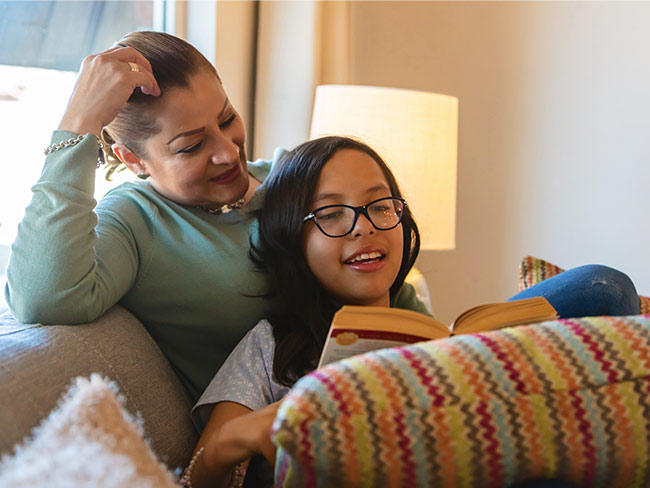
January 13, 2025
How to prevent cervical cancer
Cervical cancer is highly preventable. HPV vaccination and regular screenings …

December 26, 2024
How telehealth can make life easier for people with cancer
Virtual care connects cancer patients like Rob Tufel to a wide range of …
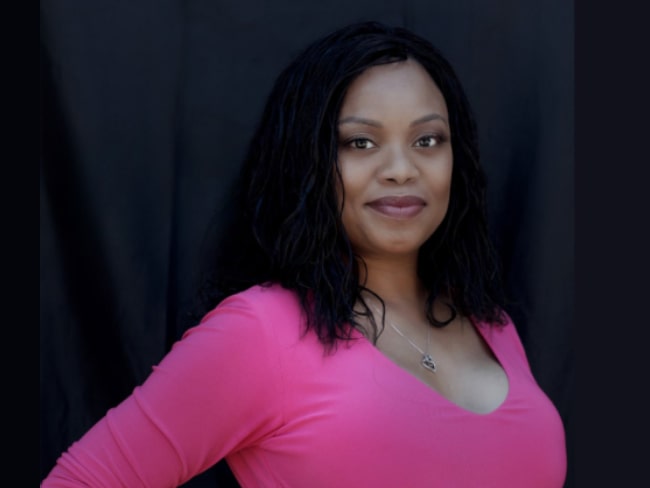
November 22, 2024
Breast cancer survivor encourages early testing
Tasha Champion shares how early testing by her oncologist at Kaiser Permanente …

November 18, 2024
The power of early detection and proactive men’s health
A father's determination to stay healthy for his 3 children led him to …
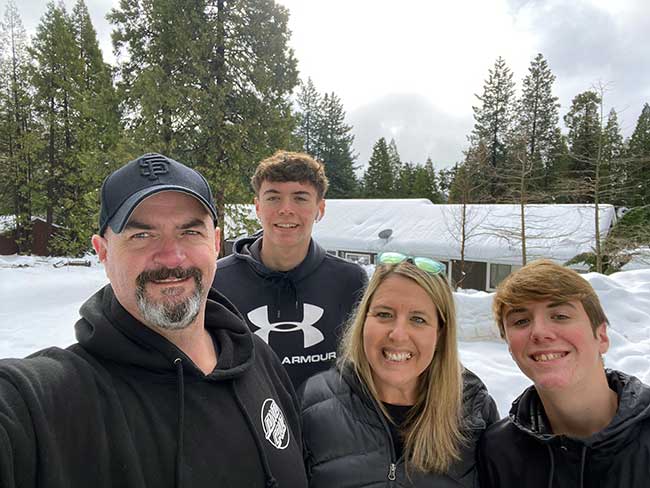
November 12, 2024
Surviving lung cancer as a nonsmoker
As a lifelong nonsmoker, Mariann Stephens was shocked to learn she had …
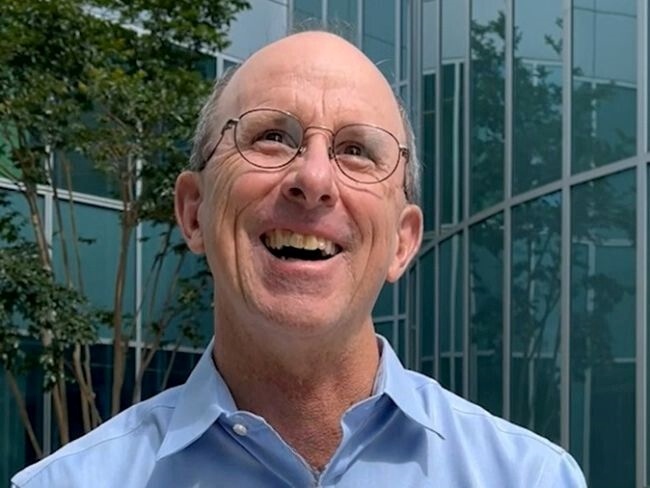
October 29, 2024
That’s not tennis elbow
A Kaiser Permanente physician thought he pinched a nerve during a tennis …
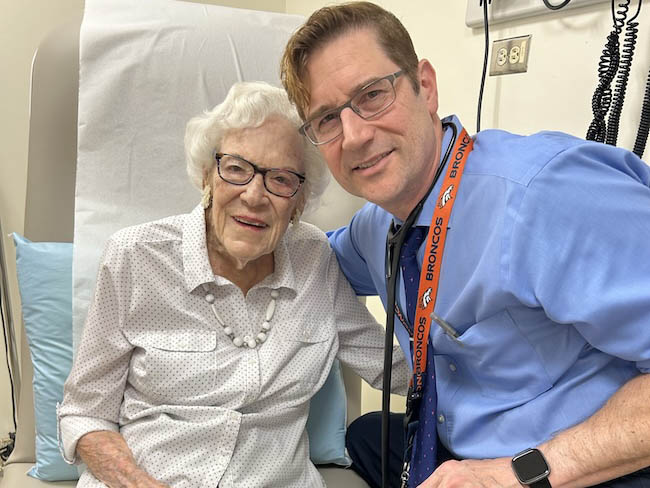
October 15, 2024
107-year-old member credits Kaiser Permanente for longevity
Bettye Garrett’s personal doctor says her healthy perspective on life’s …
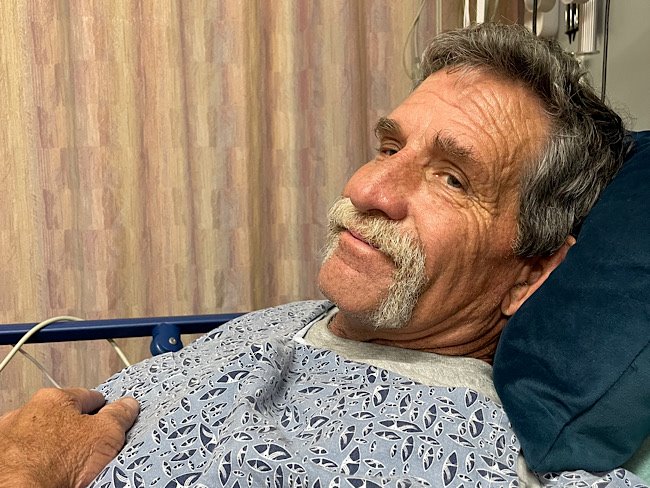
October 8, 2024
It started with a bad feeling
In August 2023, John Lynn collapsed at work. For the next year, he fought …

October 1, 2024
Screening for breast cancer: Mammogram guidelines
A Kaiser Permanente radiologist answers commonly asked questions.

October 1, 2024
From depression to connection: Older adult finds her way
After a long period of loneliness and isolation, Roberta Maguire gets the …

September 20, 2024
Ovarian cancer journey confirmed nursing student's calling
Miriam Gutierrez was diagnosed with late-stage ovarian cancer at age 31. …

September 19, 2024
First look at new Lakewood facilities
New medical offices will enhance the health care experience for members …
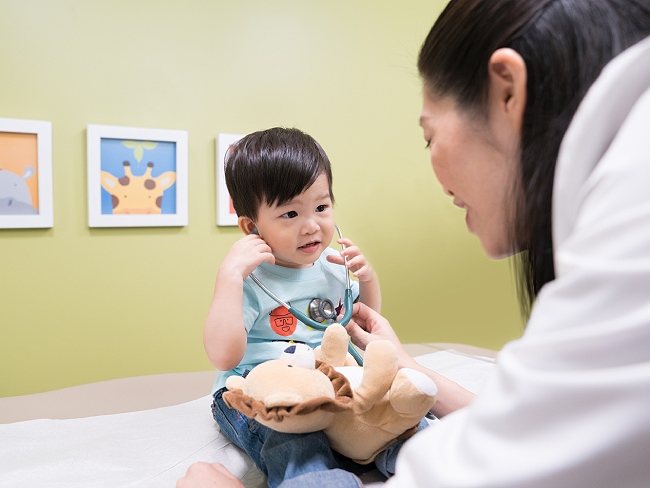
September 18, 2024
More than 100 ‘Top Docs’ recognized in Washington state
Kaiser Permanente celebrates doctors and nurse practitioners recognized …
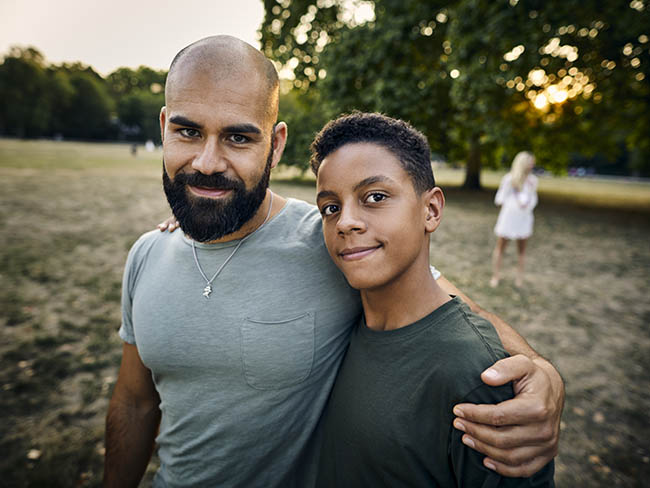
September 18, 2024
Cancer rates are rising in younger age groups
‘Connect’ with research to help understand more about the increase of certain …
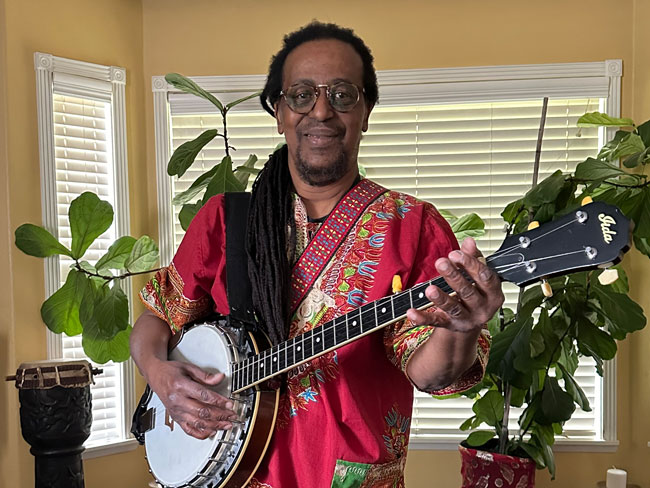
September 17, 2024
Playing on after 2 decades of cancer care
With the support of his health care team and nurse navigator, musician …
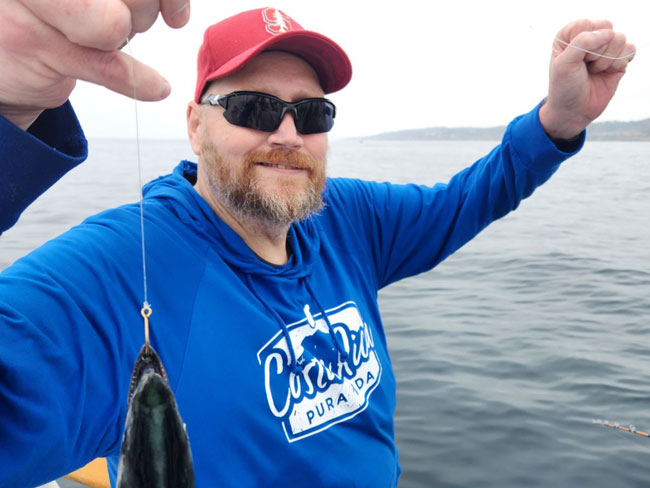
September 6, 2024
Navigating a world turned upside down after heart failure
After a life-threatening series of heart attacks at age 57, Bunnell Fockler …

August 29, 2024
After Stage 4 ovarian cancer, she’s still going strong
Donna Budway received prompt surgery followed by chemotherapy. She credits …
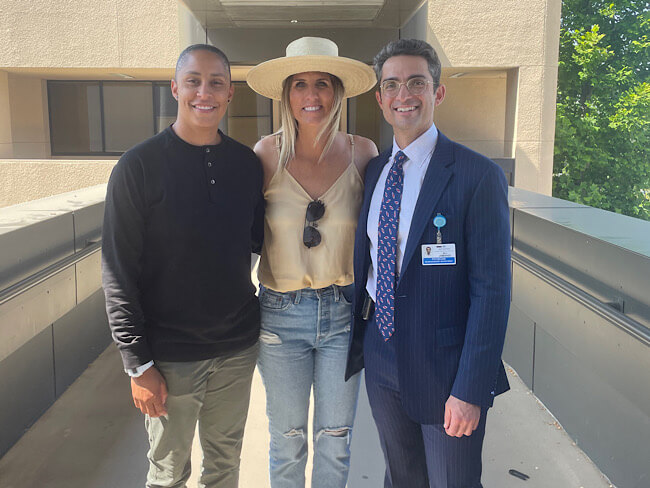
August 29, 2024
Neurosurgery and a deep, enduring doctor-patient relationship
A basketball coach’s remarkable story of undergoing brain tumor surgery …
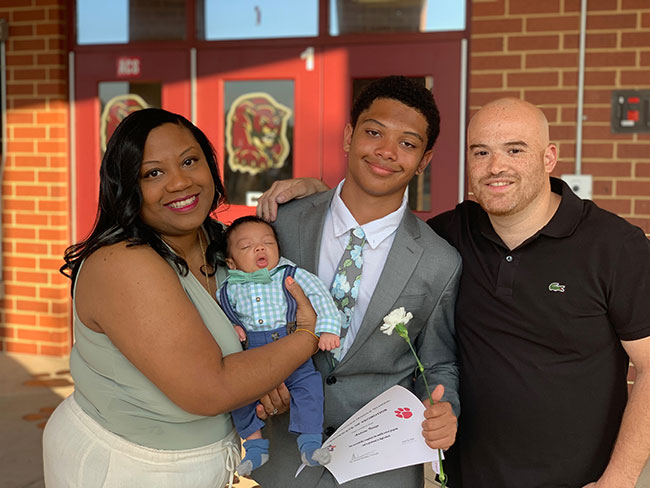
August 28, 2024
Making breastfeeding work: A second-time mom’s journey
Support from a dedicated care team helps Tiffany Anonye breastfeed her …

August 28, 2024
Final beams placed at Parker Medical Offices
The final steel beams for the new Kaiser Permanente Parker Medical Offices …
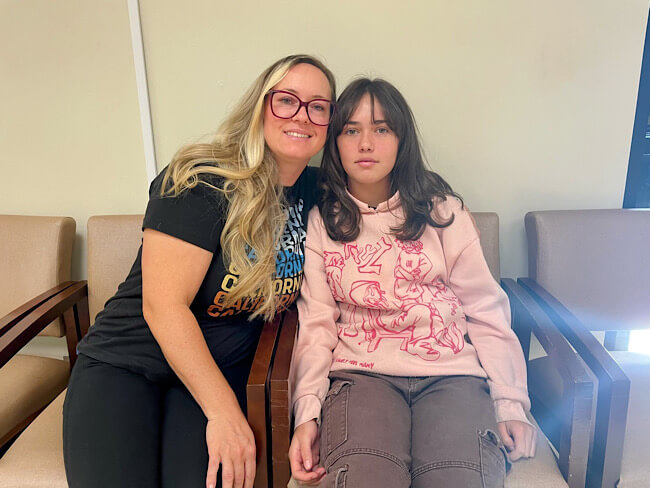
August 27, 2024
From sore throats to ice cream floats
A mother and daughter share a special bond after undergoing tonsillectomies …
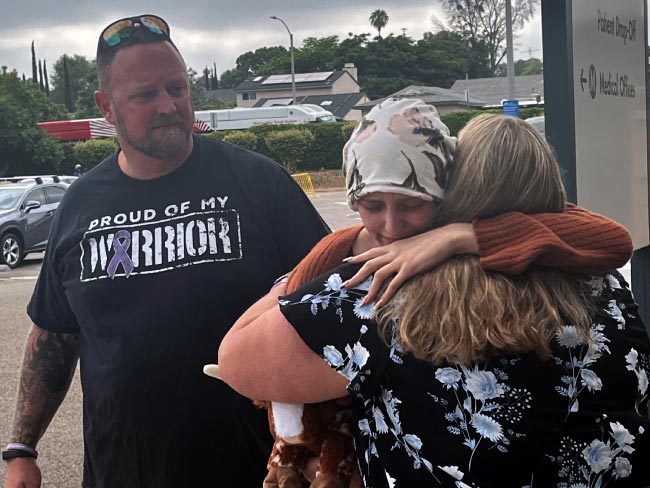
August 26, 2024
Katie's ride: Motorcycle rally a surprise for patient
Kaiser Permanente in San Diego helped plan a special send-off for Katie …
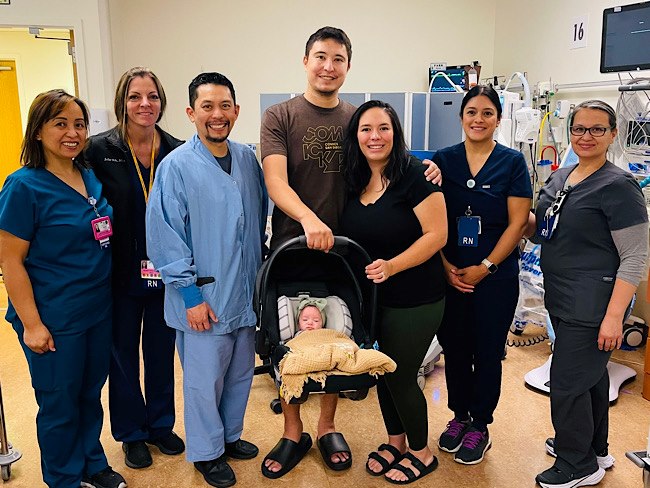
June 17, 2024
That’s a lot of babies!
Delivering multiple babies is difficult, but Kaiser Permanente care teams …
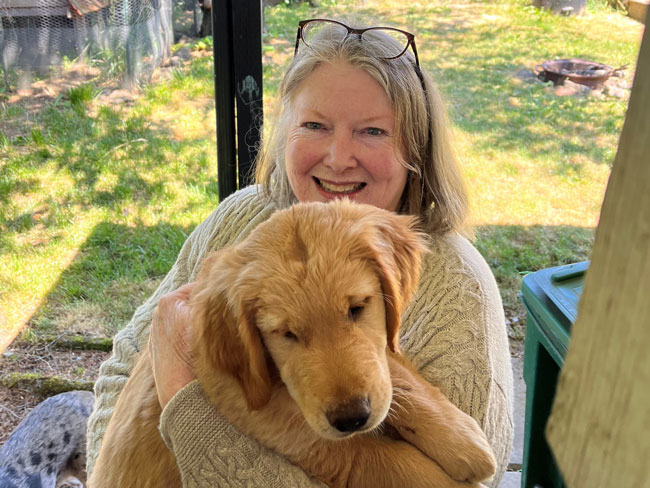
June 17, 2024
A culture of caring eases a cancer journey
Exceptional, personalized radiation oncology care helped Maura Craig treat …

June 13, 2024
Conquered 2 cancers while climbing mountains
Chris Hogan faced kidney cancer and prostate cancer at the same time. He …

June 3, 2024
A call to ‘Connect’ for cancer prevention research
Participate in a study to help uncover the causes of cancer and how to …

May 31, 2024
Stage 4 lung cancer: A story of hope
A young father is enjoying “bonus time” with his kids thanks to new targeted …

May 21, 2024
Surviving stage 4 lung cancer with immunotherapy treatment
Patients like Carol Pitman are living longer thanks to advances in lung …

May 10, 2024
Self-care is key for new parents
Feeling emotional or overwhelmed after a new baby’s arrival? You’re not …
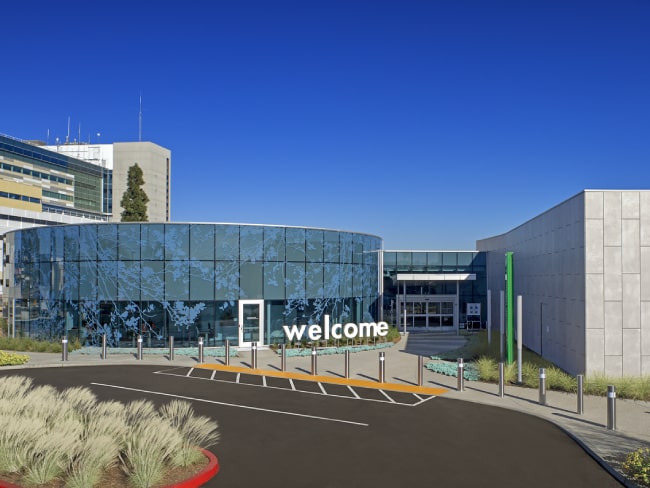
May 7, 2024
Making cancer care more convenient in Southern California
Kaiser Permanente has opened a new Radiation Oncology Center at the Bellflower …
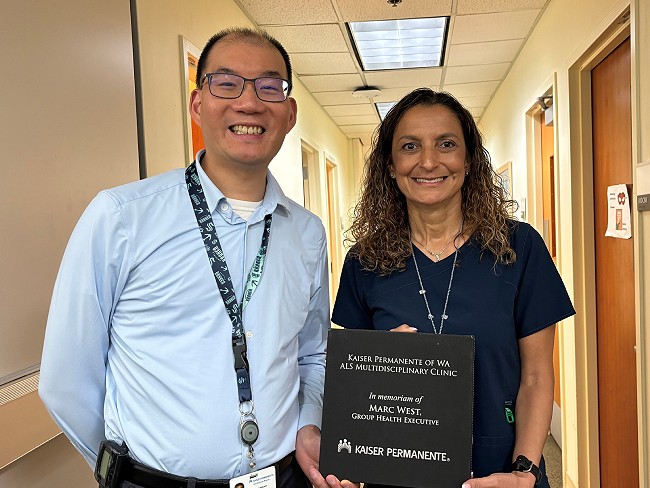
May 1, 2024
Tacoma ALS clinic recognized for high-quality care
Patients with amyotrophic lateral sclerosis, also called Lou Gehrig’s disease, …

April 17, 2024
5 common health conditions men don’t like to talk about
Some of the most common conditions affecting men carry a social stigma …

April 9, 2024
Denver Fire Department annual blood work screenings triple
It’s easy to put off recommended health screenings, and sometimes even …

April 1, 2024
Lynch syndrome: Managing the risk of hereditary colon cancer
Lynch syndrome is a gene mutation that increases colon cancer risk. Learn …

March 20, 2024
Life after cancer: Surviving and thriving
A healthy life after cancer is possible. Learn how Kaiser Permanente helps …
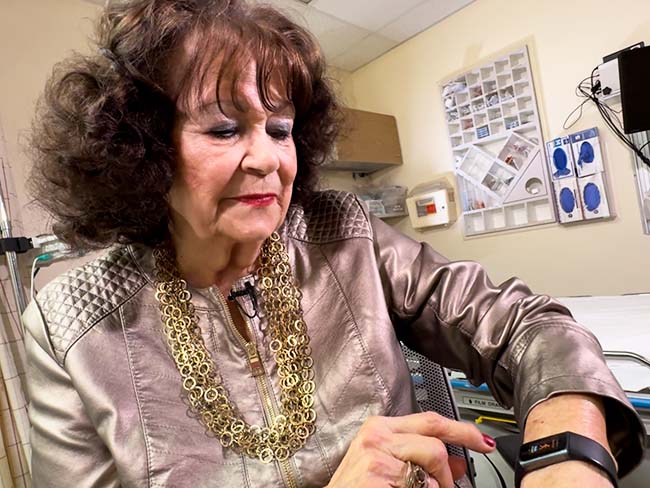
March 12, 2024
In-home recovery restores harmony to life
Colorado musician back with the band thanks to new virtual cardiac rehab …

March 6, 2024
Joining a national effort to test new ways to find cancer
As part of the Cancer Screening Research Network, our researchers will …
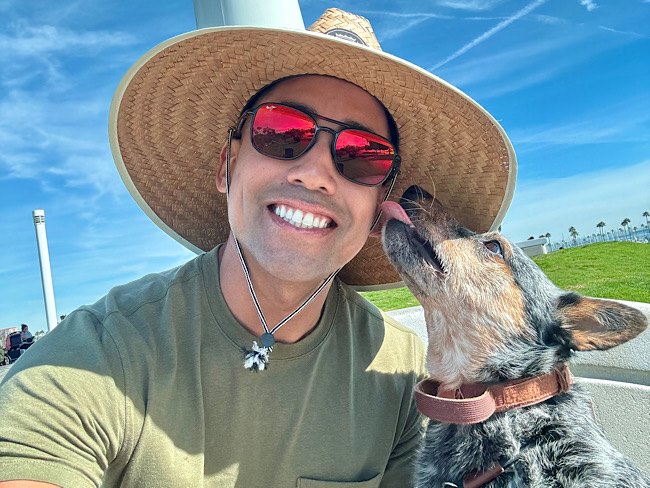
March 6, 2024
Are you dreading the spring season?
A new Kaiser Permanente facility in Bellflower, California, makes customized …
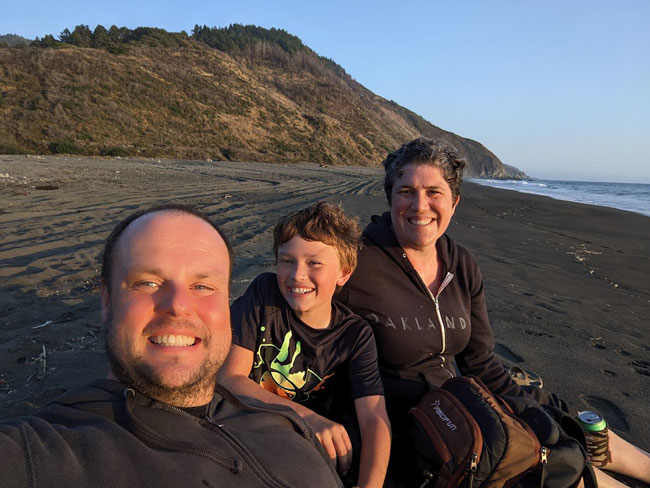
March 6, 2024
Colon cancer screening: She’s glad she didn’t wait
A timely preventive test reveals Rebecca Kucera has cancer. Swift treatment …

March 5, 2024
Researchers look for ways to find pancreatic cancer early
Early detection of the disease, before it becomes advanced, will increase …

February 22, 2024
The journey of a lifetime
Care teams at Kaiser Permanente Fontana Medical Center helped Phillip Crawford …

February 21, 2024
From planning his funeral to celebrating his wedding
Gabriel Abarca had no hope for his future. Then the team at Kaiser Permanente …

February 21, 2024
Recovering at home after a double mastectomy
Innovative surgical recovery program helps breast cancer patients safely …
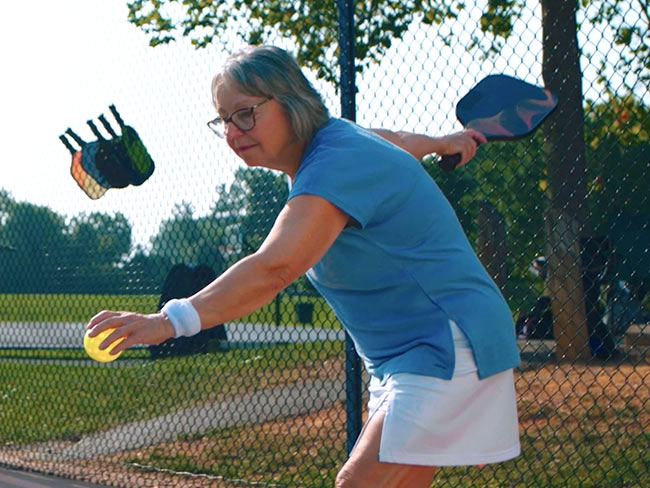
January 26, 2024
Retiree back in the swing of things after heart procedure
Tookie Gentilcore returns to enjoying life thanks to a quick, safe method …

January 24, 2024
A full-circle journey for one cancer survivor
Grateful for compassionate and successful Hodgkin lymphoma treatment at …

January 10, 2024
‘You don’t know unless you ask them’
Kaiser Permanente’s Patient Advisory Councils help us create exceptional …
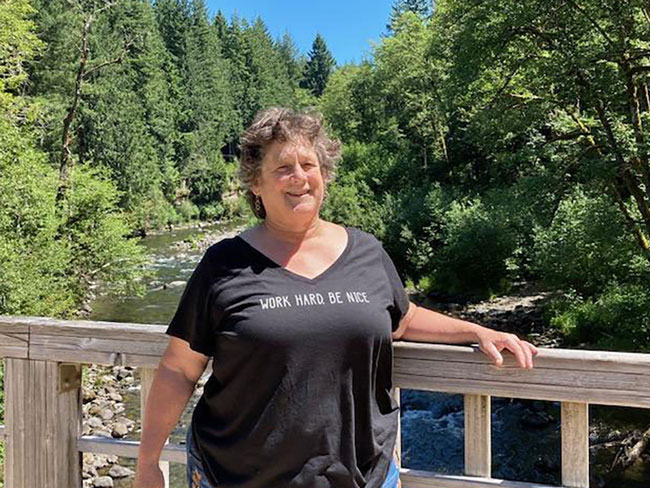
December 13, 2023
Nurse navigators guide patients from diagnosis to treatment
An unexpected cancer diagnosis left Jennifer Martin unsure of the next …

December 6, 2023
Leading research with gratitude
Learn how you can participate in a study to uncover what causes cancer …

December 1, 2023
Surviving — and thriving — after cancer
From diagnosis to recovery, David Parsons, MD, shares how screening, treatment, …
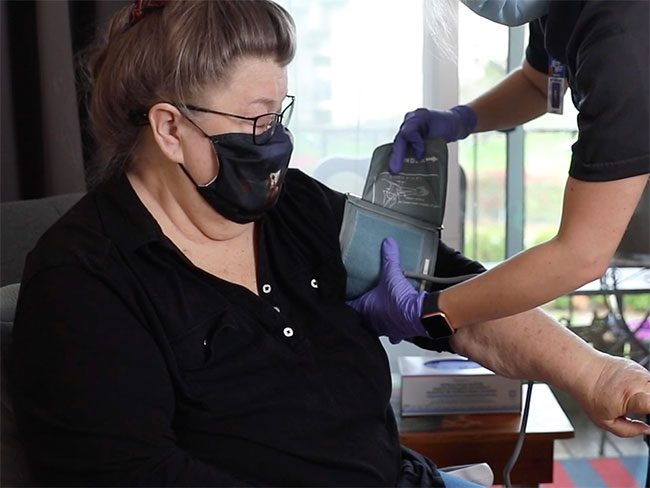
November 15, 2023
Care at home: Giving patients what they want
Our Advanced Care at Home program provides high-quality, safe care in familiar, …

October 25, 2023
Breast cancer during pregnancy: Caring for mom and baby
A team of specialists treats an expecting mother’s cancer while keeping …

October 23, 2023
A renewed sense of purpose after surviving breast cancer
Joy Short, a Kaiser Permanente member and employee, turned her breast cancer …
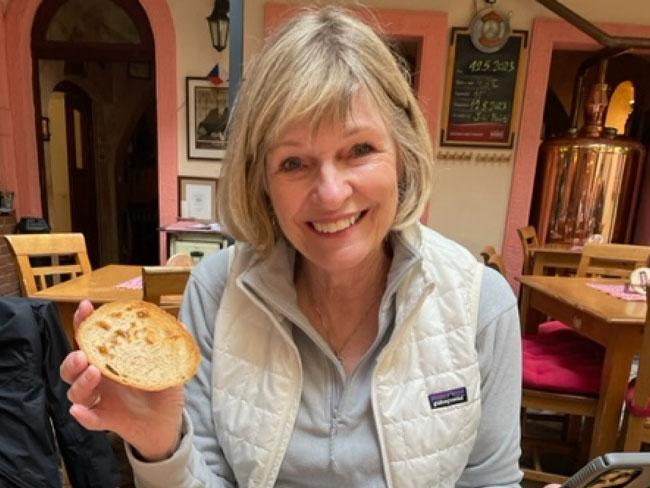
October 11, 2023
Early breast cancer detection improves quality of life
For 75-year-old Peggy Dickston, a surprise diagnosis was caught early thanks …

September 20, 2023
Healing after a heart attack
For years, serious heart attacks meant hours of weekly appointments. Now, …
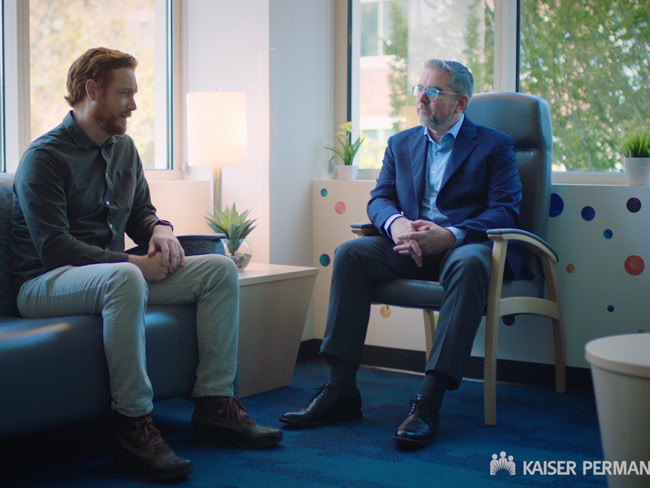
September 6, 2023
Recovery from addiction is possible
Our clinicians help patients get the care they need to move forward with …

August 17, 2023
Beyond clinic walls: Research supporting healthy communities
Stories in the Department of Research & Evaluation 2022 Annual Report demonstrat …

August 17, 2023
Cancer research: The role of immunotherapy
Research and clinical trials play a vital role in advancing cancer treatment …

August 16, 2023
Cervical cancer screening: Exploring the at-home HPV test
Kaiser Permanente is at the forefront of cervical cancer research. Find …

August 14, 2023
Tips for ensuring a safe and healthy college experience
Students should study up on their care options to ace their school experience. …

August 14, 2023
Marla’s story: Surviving acute promyelocytic leukemia
After a diagnosis for a rare type of blood cancer, Marla Marriott got high-quali …

August 4, 2023
Eating well and adopting healthy habits helps prevent cancer
Learn how lifestyle medicine is part of cancer care at Kaiser Permanente.
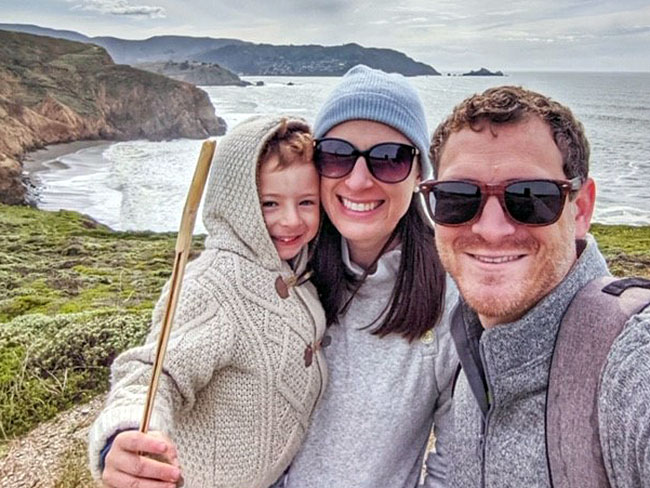
July 27, 2023
Courageously facing hereditary breast cancer
Fay Gordon's breast cancer was caught in the early stages thanks to genetic …
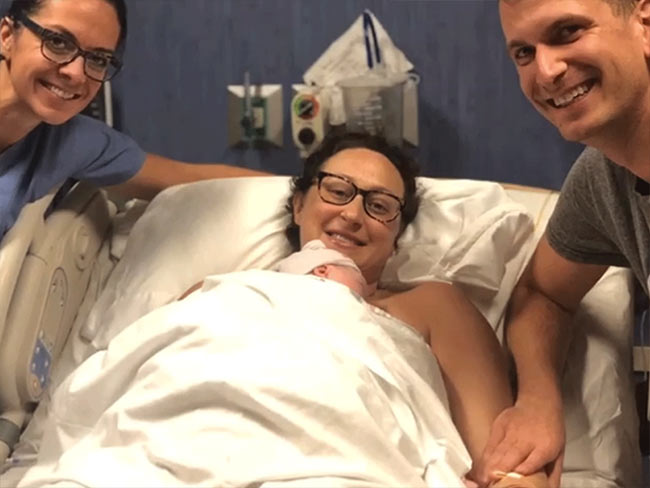
July 26, 2023
Can you get chemotherapy while pregnant?
Chemotherapy can be an option during pregnancy. Find out how Kaiser Permanente …
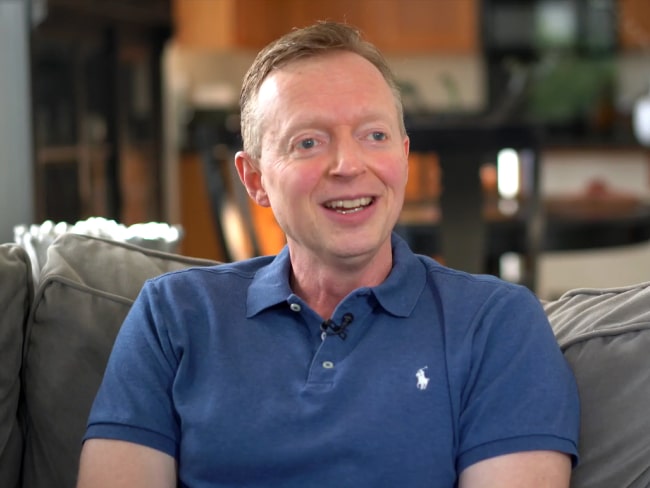
July 21, 2023
Thankful for every day after HPV-related cancer diagnosis
Michael West shares his incredible journey from diagnosis to treatment …
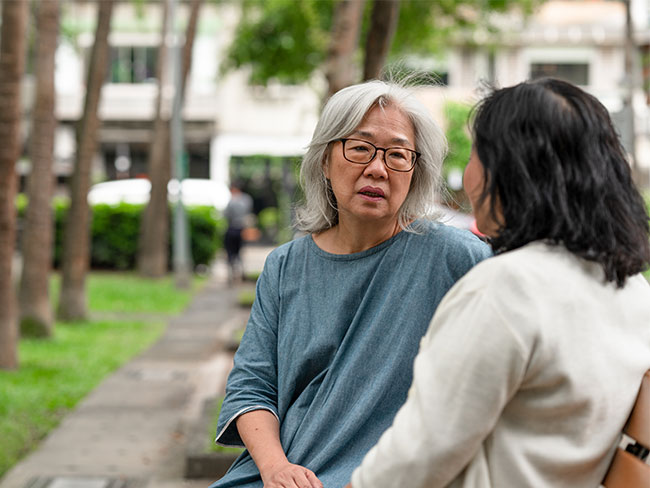
July 14, 2023
Breast reconstruction surgery after cancer
A Kaiser Permanente plastic surgeon explains breast reconstruction options …
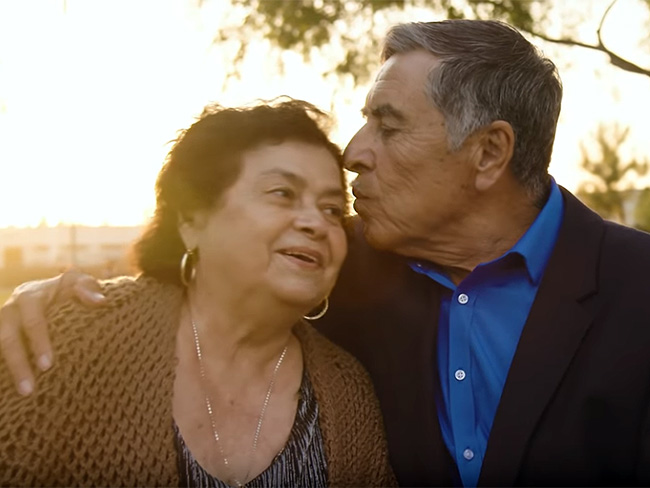
July 10, 2023
Beating colon cancer together: Miguel and Paula’s story
After they were both diagnosed with colon cancer, Miguel and Paula fought …
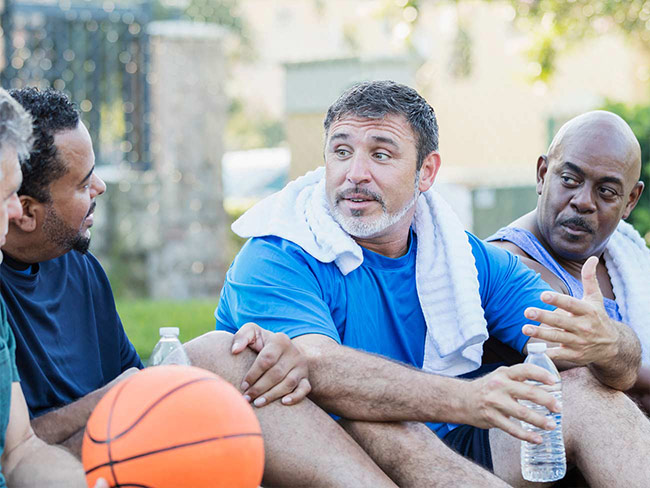
June 30, 2023
Doctors' top tips to manage prostate cancer risk factors
Regardless of your age, race, or family history, you can take steps to …
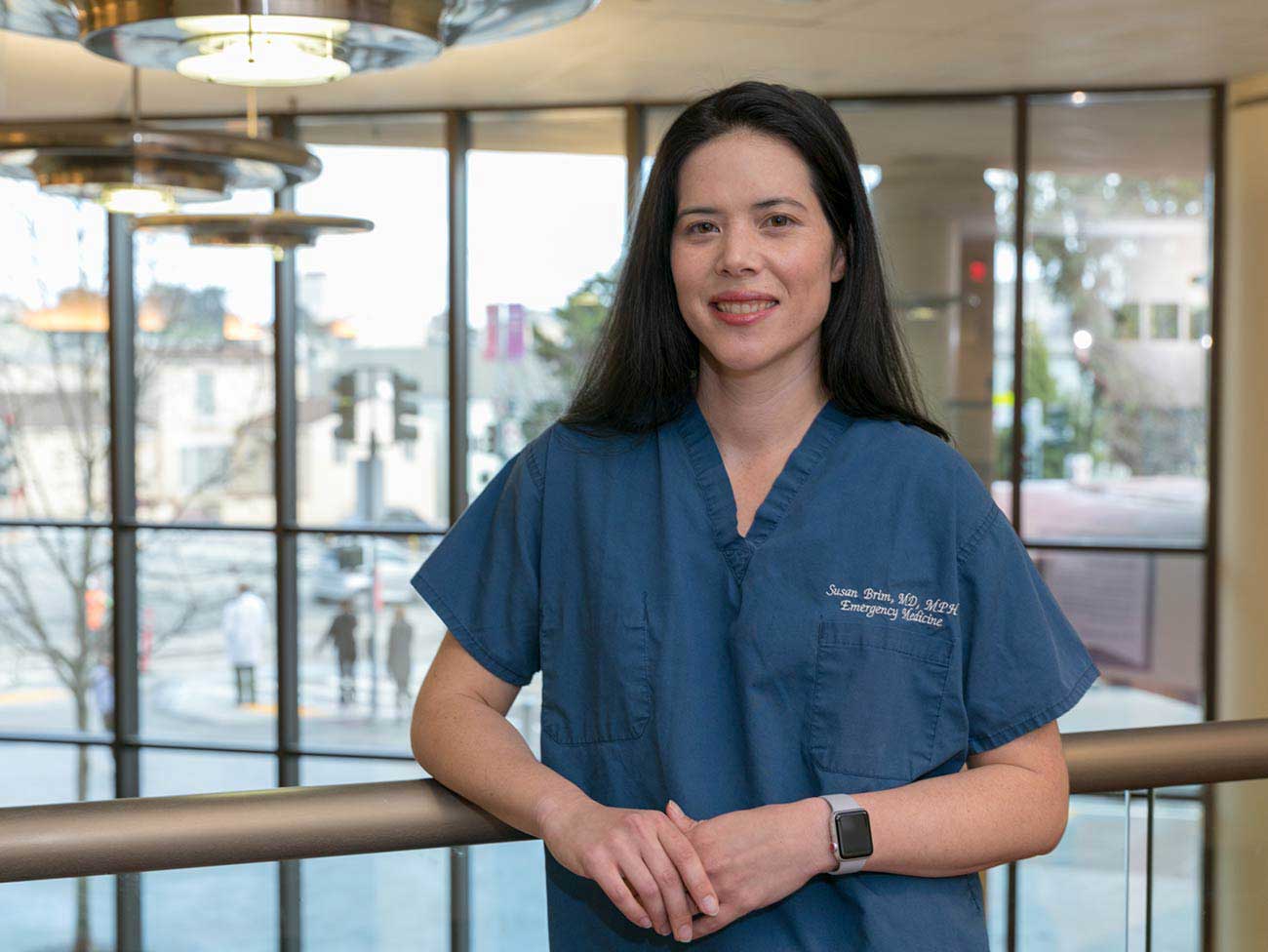
June 30, 2023
Lung cancer survivor received ‘pioneering’ care
Doctor and mother of 3 Susan Brim received top-notch care after her lung …
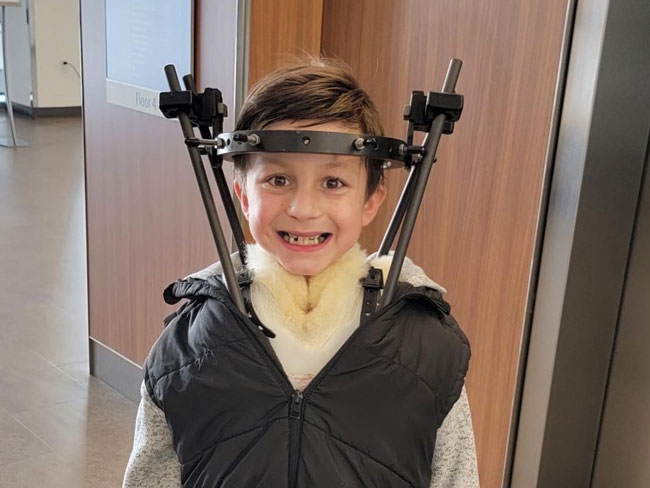
June 27, 2023
Comforting, personalized care for a kiddo with cancer
Carter Shaver from Portland, Oregon, shares his optimistic smile after …

June 22, 2023
Higher survival rates for our patients with colon cancer
A new study compares Kaiser Permanente members in Southern California to …

June 15, 2023
Stay safe while having fun in the sun
Tips for preventing sunburn and decreasing the risk of skin cancer.
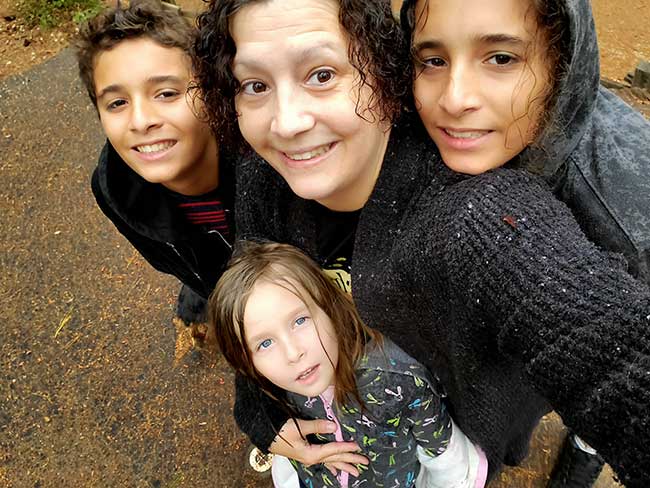
June 14, 2023
Living with stage 4 breast cancer
Thanks to personalized care from a team of skilled doctors, Christina McAmis …

May 30, 2023
The healing power of shared cancer experience
Peer mentoring program matches new cancer patients with others who’ve gone …

April 25, 2023
Hannah Peters, MD, provides essential care to ‘Rosies’
When thousands of women industrial workers, often called “Rosies,” joined …

March 17, 2023
A call to 'Connect' for cancer research
A new study invites participants in Oregon to help uncover what causes …

March 14, 2023
Colorectal cancer on the rise among younger adults
Learn why early screening is crucial for prevention and treatment.
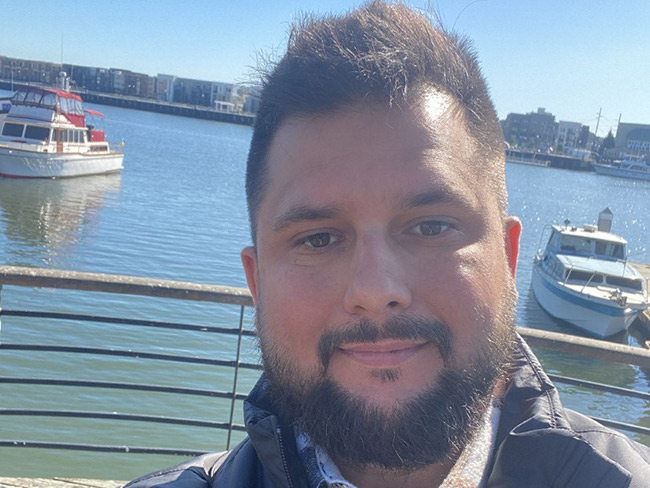
March 6, 2023
Living with long COVID
From avid snowboarder to chronically ill patient. How Kaiser Permanente …
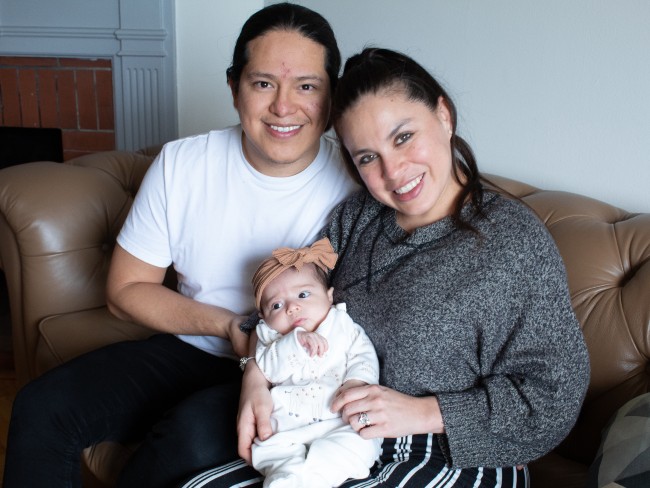
March 1, 2023
‘I am so grateful for life’
After a traumatic boating accident, Gabriela Curiel was airlifted to the …
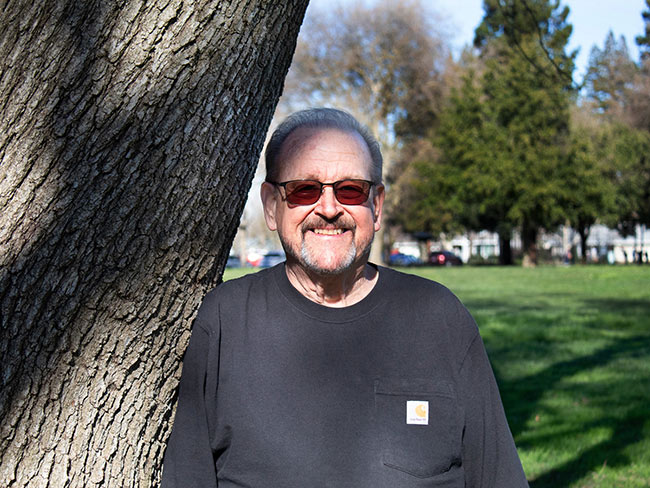
February 15, 2023
A new chapter for male patient with breast cancer
A multidisciplinary care team acted fast to help save the life of a Kaiser …

February 1, 2023
Her heart was telling her something wasn’t right
When a Kaiser Permanente member discovered she had an irregular heartbeat …
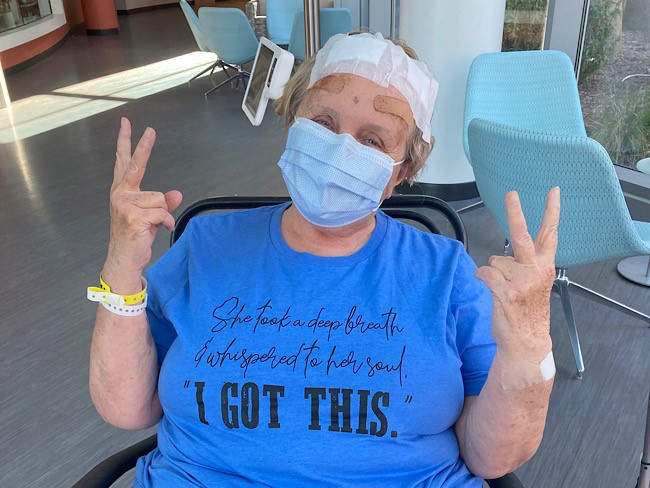
January 25, 2023
Awake brain surgery changed patient’s life
A Southern California member with Parkinson’s disease underwent deep brain …
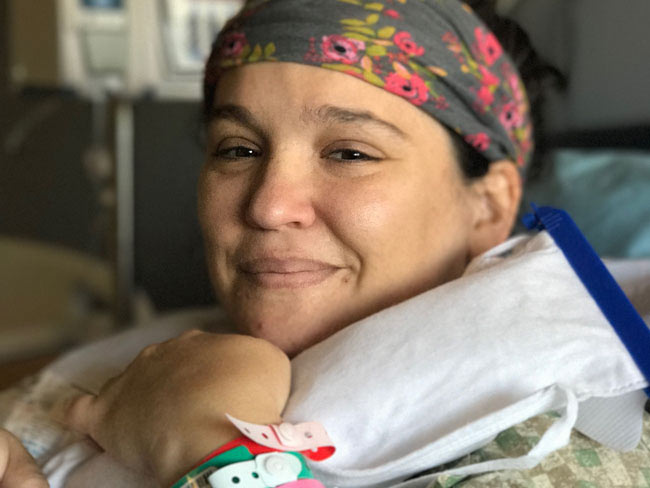
December 21, 2022
From cancer patient to cancer colleague
A Kaiser Permanente member’s cancer journey inspires her to join the team …

November 14, 2022
It’s time to rethink health care quality measurement
To meaningfully improve health equity, we must shift our focus to outcomes …
November 11, 2022
Our integrated care model
We’re different than other health plans, and that’s how we think health …
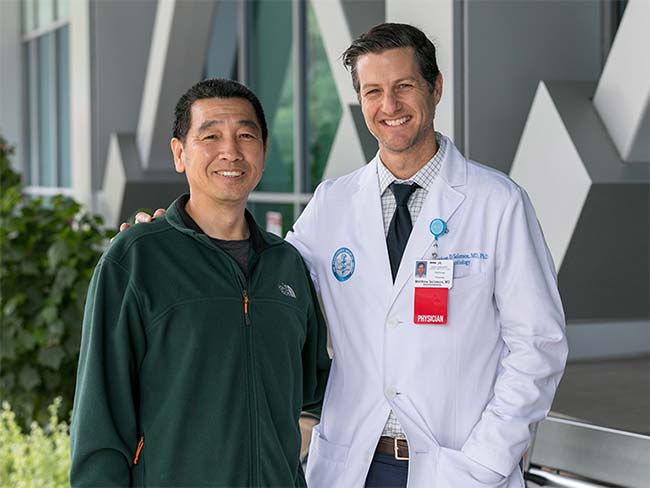
September 27, 2022
A heart saved
When Rong Fang had a life-threatening heart attack, specialists at 2 Kaiser …
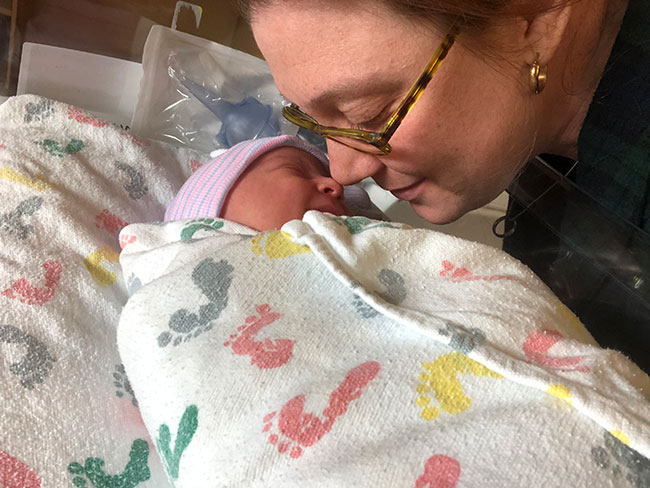
September 27, 2022
Maternity appointments from the comfort of home
New care option offers pregnant patients a mix of in-person and video visits.
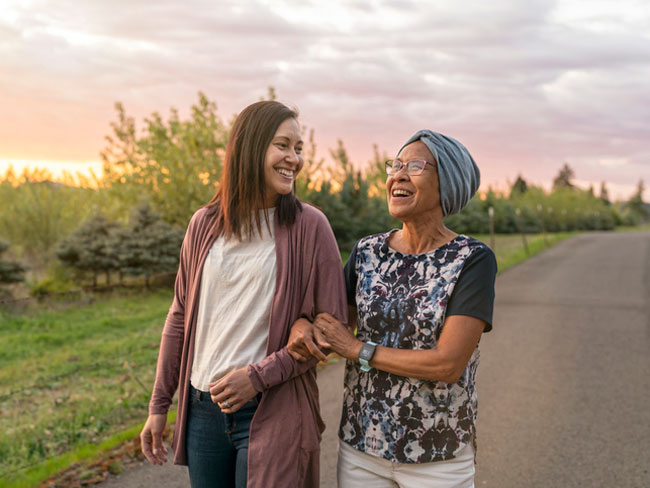
August 17, 2022
Cancer clinical trials: Can they help find a cure?
These important research studies aim to help patients live longer, better …
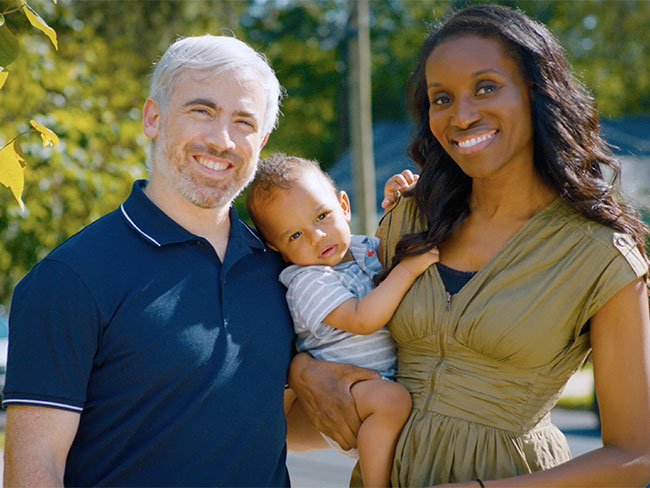
May 12, 2022
Endometriosis and motherhood: Grace’s story
She wanted relief from pain and a healthy baby. Her care team delivered.

May 5, 2022
Research study will inform the future of cancer prevention
Connect for Cancer Prevention Study’s goal to recruit 200,000 participants …
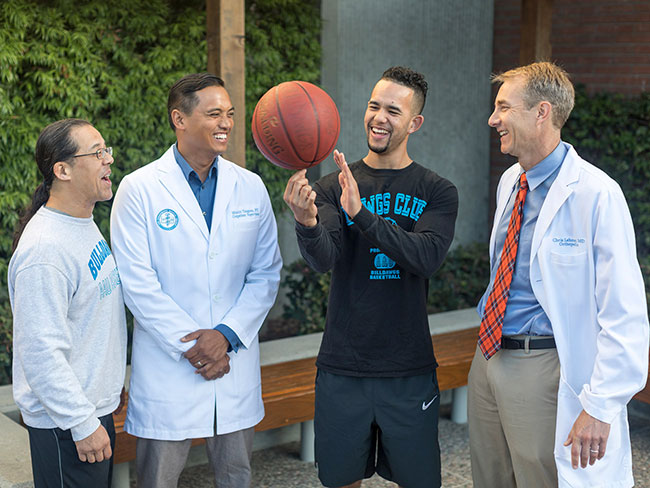
April 25, 2022
Sports medicine changes the game for father and son
When knee injuries struck the basketball-loving pair around the same time, …
